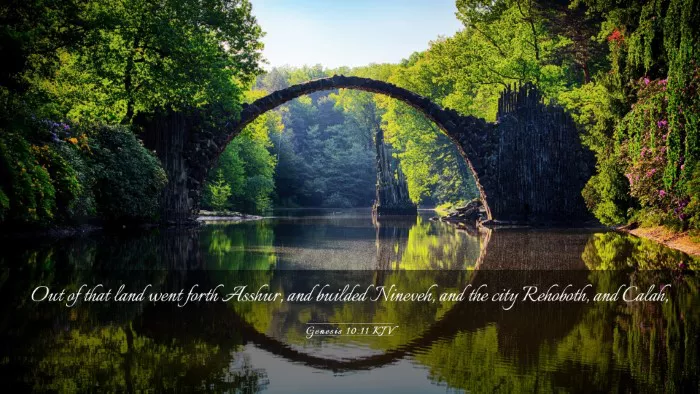Read the Daily Bible Verse Genesis 10:11 To Strengthen Your Spiritual Journey.
Genesis 10:11 (KJV):
Out of that land went forth Asshur, and builded Nineveh, and the city Rehoboth, and Calah, and Resen between Nineveh and Calah: the same is a great city.
Genesis 10:11 offers a glimpse into the ancient world and the origins of significant historical cities. This verse provides context for the development of cities in the post-Flood era and illustrates the expansion of humanity’s civilization.
Background
Genesis 10:11 is part of the Table of Nations, a chapter that outlines the descendants of Noah’s sons and the nations that emerged from them. Specifically, this verse focuses on Asshur, a descendant of Shem, and his role in establishing major cities in the ancient Near East. Asshur is often associated with the Assyrian Empire, which would become a dominant power in the region.
In this verse, Asshur’s building of cities is noted, including Nineveh, which would later become the capital of the Assyrian Empire. The verse situates these cities geographically, noting their proximity to each other, and highlights their significance as great cities in the ancient world.
Meaning of Genesis 10:11
Genesis 10:11 illustrates the expansion and development of post-Flood humanity. Asshur’s establishment of cities reflects the ongoing growth and organization of societies after the Flood. The verse emphasizes the importance of these cities, particularly Nineveh, as central to the Assyrian civilization.
Nineveh: Known as a major city of the Assyrian Empire, it becomes one of the most significant archaeological sites, revealing a great deal about ancient Assyrian culture.
Rehoboth: Less well-documented than Nineveh, but still a notable settlement.
Calah: Another key city in the Assyrian Empire, which was later known as Nimrud.
Resen: Situated between Nineveh and Calah, adding to the network of significant Assyrian cities.
The reference to these cities underscores their historical and strategic importance and reflects the organizational capabilities of early post-Flood societies.
See also: Genesis 10:10 Meaning, Context & Commentary
Application of Genesis 10:11 in Life
Genesis 10:11 teaches us about the value of historical and cultural heritage. Just as Asshur’s cities contributed to the formation of civilizations, understanding our own history and heritage can provide insight and guidance for contemporary life. Recognizing the achievements and developments of the past can inspire and inform current endeavors, reminding us of the importance of building and preserving our own communities.
In a personal context, this verse encourages us to appreciate the foundations laid by those who came before us. It can be a call to reflect on our contributions to society and consider how we can build upon the legacy we inherit.
Comparison with Other Biblical Texts
Genesis 10:11 can be compared to other biblical references to Assyria and its cities:
2 Kings 19:36: This verse references the destruction of Nineveh, indicating its significant role in biblical history.
Nahum 1:1: This book is a prophecy against Nineveh, highlighting its eventual downfall despite its former greatness.
Jonah 1:1-2: Jonah is sent to Nineveh to call for repentance, showing Nineveh’s prominence in the biblical narrative.
These comparisons highlight the transition of Assyria from a powerful civilization to a symbol of divine judgment, underscoring the dynamic nature of biblical history.
Modern Relevance
In today’s context, Genesis 10:11 reminds us of the ongoing relevance of historical cities and cultures. It underscores the importance of historical awareness and the impact of ancient civilizations on modern society. The study of such cities can provide valuable lessons in governance, urban planning, and cultural development.
Furthermore, the verse prompts reflection on how our own cities and societies are shaped and how they might be remembered in future generations. It serves as a reminder of the enduring influence of historical developments on our current world.
Conclusion
Genesis 10:11 offers a historical snapshot of early post-Flood civilizations and highlights the significance of Asshur’s contributions to the development of major cities. It provides valuable insights into the expansion and organization of early societies and prompts reflection on our own historical and cultural heritage. By examining the past, we gain a better understanding of our present and future, encouraging us to build upon the legacies we inherit.
Comments on Genesis 10:11
Historical Impact: “Genesis 10:11 highlights the foundational role of Asshur in building cities that would shape the ancient Near East. The significance of Nineveh and its companions cannot be overstated.”
Cultural Legacy: “The cities mentioned in Genesis 10:11 reflect the advanced organizational skills of early civilizations. They serve as a testament to human ingenuity and cultural development.”
Biblical Significance: “This verse is a prelude to the later biblical narratives involving Nineveh, illustrating how early historical events set the stage for future developments in the biblical story.”
Modern Reflection: “Genesis 10:11 invites us to consider the impact of our own contributions to society. Just as ancient cities left a legacy, so too can our actions shape the future.”
This exploration of Genesis 10:11 not only deepens our understanding of ancient history but also connects it to contemporary reflections on heritage and societal development.


